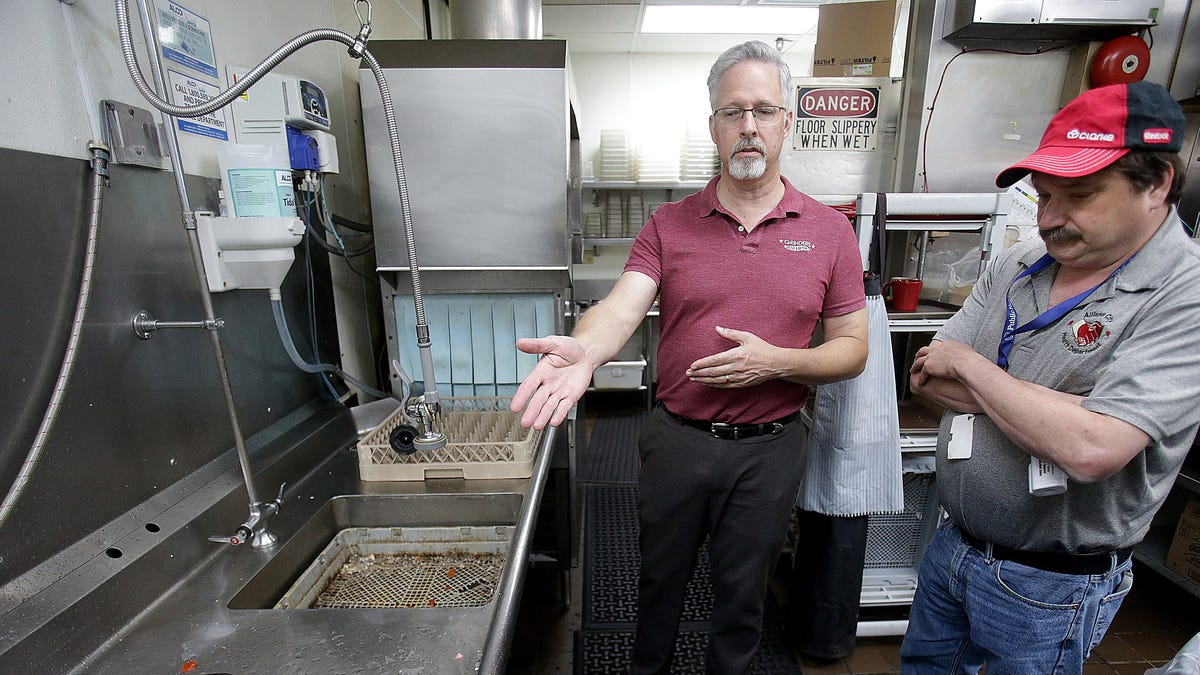[ad_1]
ALLIANCE – His red and black ball cap snugly in place, Bill Robinson started his inspection of Grinders Above & Beyond restaurant even before the official inspection began.
The environmental health director for the Alliance Health Department, Robinson had to use the men’s room anyway, so he checked out its operating condition first. Next up, the women’s room.
He knocked on the door.
“Health department,” he announced.
No reply.
Nearby diners crooked their necks to sneak a peek.
Robinson pushed the door open. He flushed the toilets. He noted the waste had the required lid. He checked the soap dispenser. Turned on the hot water to ensure it was at least warm. Drying equipment was in place.
Check. Check. Check. Check. Check.
He washed his hands, then headed to the kitchen.
Restaurant health inspections: How safe is your eatery? Repository reviews 1,010 health inspections
TD’s Tailgate review: Review: Coconut shrimp steals the show at TD’s Tailgate Grill
Robinson makes a habit of analyzing dining rooms on his way through. He used to be the city’s code enforcement officer, so he’s experienced in looking for signs of leaks or broken fixtures.
On this recent day, Robinson conducted both a standard and critical control point inspection of the Grinders on West State Street. As a risk level 4 license-holder, the restaurant must receive at least two of each type of inspection in a licensing year, which runs from March 1 through the following February.
Brad Morgan, vice president of operations for seven Grinders locations, greeted Robinson. Morgan also agreed to allow a Repository reporter and photographer to follow along on the inspections.
The eatery has regularly been a model citizen when it comes to following the Ohio Uniform Food Safety Code — the Bible of do’s, don’ts and how to’s for food service operators in the state. For the most recent licensing year, Grinders received no health violations on four inspections.
Inside the kitchen, Robinson surveyed the dishwashing machine. He asked Morgan to run several loads through it. Robinson fixed his eyes on the temperature gauge to ensure it reached minimum temperatures of 160 degrees Fahrenheit and 185 degrees, as it washed, rinsed and sanitized.
Check and Check.
New restaurant at Belden Village Mall?: Taste for the Space brings restaurant competition to Belden Village Mall
Health inspections throughout Stark County
Robinson inspects all the Alliance restaurants, including the 91 risk level 3 and 4 license-holders captured in a Repository review of inspection reports in all four health department jurisdictions in Stark County. A colleague takes care of the special event and mobile operators.
“Sometimes I’ll go in at night, just to change it up,” Robinson said, adding he also tries to eat at every restaurant in the city at least once a year.
Health inspectors aren’t technically called health inspectors. They used to be known as sanitarians. A few years ago, the state changed their titles to environmental health specialists to better describe their roles, which can include other duties in smaller health departments.
Robinson and his counterparts at the Canton, Massillon and Stark County health departments are responsible for making sure the food you eat, everywhere from snack bars and concession stands to sit-down restaurants, is safe — so you won’t come down with a foodborne illness, which in some cases can make you sick, but on rare occasions could kill you.
They divide their findings into two categories: Non-critical or critical violations. Critical ones are just that — critical. They are the kind of violations that pose the greatest risk of causing a foodborne illness, and often have to do with the temperatures at which food is prepared and stored.
Cold foods must be kept cold; hot foods hot.
Otherwise, pathogens can grow like the plague.
A couple general magic numbers are 41 degrees and 135 degrees, respectively.
In unison, health department inspectors say one of their primary goals is to educate restaurant operators. It’s not just about fixing what’s wrong, it’s also making sure the same problem doesn’t occur again.
“We’re not here to close anyone down,” said Randy Ruszkowski, who as unit manager at the county health department oversees the inspection program.
Education and communication usually works better.
“Most of my operators will walk along with me,” said Bethany Perkowski, environmental health director for the Massillon Health Department. “And we will go over everything together.”
She said her inspections begin before she walks in the door, as she scans the exterior for litter.
“Looking at everything all at once,” Perkowski explained.
Annmarie Butusov, environmental health director for the Canton Health Department, said the science of food safety has improved through the years. It used to be common for mom or grandma to leave a frozen roast or turkey on the counter to thaw overnight for the next day.
That’s a big non-no.
“What pathogens grow at which temperatures … we have a better understanding of all that,” she said.
Butusov said she’s seen it all on restaurant inspections. She’s watched operators gulp when she walked in. She’s dealt with employees in tears. She saw a waitress quit on the spot.
Running a restaurant is tough; she respects that.
Meet Kelsey Davis: Let’s go on a food journey together. Say hello to the new food reporter in town
Temperatures, quizzes and questions
Robinson glided through the Grinders food preparation area, asking questions about labels on a variety of spices and baking products in plastic containers. On the kitchen line, he jabbed a temperature probe into tomatoes. He asked Morgan to use a Grinders probe on the mashed potatoes.
“I need 135 or higher,” Robinson announced.
They were 141 degrees.
He marveled at a long frozen stick in the Grinders freezer. He even took a photo of it on his cellphone to show other operators. In the business, it’s referred to as a chill wand — a cheap but handy device used to help quickly cool soups, sauces and gravies, which in turn improves food safety.
Robinson quizzed a line cook on which illnesses she was not allowed to come to work with. He tested a waitress on her knowledge of food allergies by ordering a salad and a diet Pepsi.
“I’m allergic to eggs, though,” he told her.
No eggs in the Key West salad, she offered.
“Can I have ranch dressing?” Robinson asked.
Hmmmm.
He asked her to retrieve a container of ranch dressing from the cooler. She returned and they examined the label of ingredients together. Sure enough, one of the ingredients in ranch is egg yolks.
At the end of the one-hour-plus inspection, Robinson sat with Morgan in the dining room to go over the findings.
No violations.
He also logged several pages of checklists he keeps on file, noting which vendors supply various products to Grinders, as well as the restaurant’s contingency plans should there be a power outage or loss of water supply.
Robinson planned to dash to his car to retrieve a new first aid for choking poster to replace a tattered one in the Grinders kitchen, before grabbing lunch at nearby China Buffet.
[ad_2]
Source link



